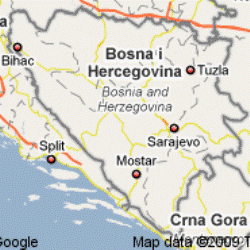Human Rights House of Sarajevo reacted last week with a press release regarding the concluding observations of the UN Committee on the Elimination of Racial Discrimination – CERD at its August session, on the situation in Bosnia and Herzegovina on the point of applying the International Convention on the Elimination of All Forms of Racial Discrimination.
In already published Concluding Observations, the Committee has evaluated the positive integration of Ombudsman institutions and the adoption of the prohibition of discrimination. However, the main objection to the Committee refers to the need of urgent removal of discriminatory provisions of the Constitution of Bosnia and Herzegovina in order to enable every citizen, regardless of nationality or residence, an opportunity to elect and to be elected.
– Roma population still the most vulnerable group in BiH
The Committee concluded that there is continued presence of discrimination against Roma and it expressed its particular concern over the fact that there is still a large number of Roma children that is not reported or recorded in newborn registration service. The Committtee therefore recommended to BH authorities to enable Roma to obtain identity documents which is the basis for achieving their political, civil and other human rights.
The decision to implement action plans within the framework of the Decade of Roma, is supported and those action plans should provide greater employment of Roma, better housing conditions, adequate education, and social and health protection of Roma population. The special need was stressed for stronger engagement of BiH authorities in the fight against prejudices towards Roma, that largely generate the appearance of discrimination against Roma.
– Issues of the return of refugees, displaced persons, ethnic tensions and hate speech must be resolved
Further on, it was concluded by the Committee that there are obstacles in regards to the return of the refugees and displaced persons and it was recommended to BiH authorities to provide equal conditions for employment, education, health and social care to the returnees in BiH.
The Committee underlined the necessity to apply the provisions of criminal laws that prohibit the use of hate speech and crimes driven by hatred, and urges BiH authorities to promote tolerance and coexistence between members of different ethnic and religious groups.
– Background on BiH CERD report
Non-governmental organizations in Bosnia-Herzegovina have gathered around the Human Rights House of Sarajevo in June this year, and expressed their regret that the authorities have failed to effectively monitor implementation of the International Convention on the Elimination of All Forms of Racial Discrimination in Bosnia and Herzegovina regularly, consistently and within the prescribed deadlines, since the concept of racial discrimination also encompasses ethnic and religious discrimination, segregation and intolerance.
In behalf of the NGO sector in BiH, CERD report was jointly produced by human rights organisations and civil society activists based in Bosnia and Herzegovina, who are working on various human rights issues and who engaged nationally in an effort to eliminate racial discrimination:
-
Human Rights House of Sarajevo;
-
Helsinki Committee for Human Rights in Bosnia-Herzegovina;
-
Serbian Civic Council, Movement for Equality – SGV;
-
Croatian People’s Council – HNV;
-
Youth Initiative for Human Rights in Bosnia-Herzegovina – YIHR;
-
European Law Students’ Association – ELSA;
-
Mr. Dervo Sejdic, Roma activist;
-
Mr. Boris Kozemjakin, President of Jewish Municipality of Sarajevo.
Around the Human Rights House in Sarajevo, independent NGOs had already worked together to produce a joint report for the Human Rights Council Universal Periodic Review (UPR) of Bosnia and Herzegovina, with continuous support of Human Rights House Foundation.
Documents:
- CERD – Press Release by HRH Sarajevo
Press release by HRH Sarajevo regarding CERD’s concluding observations - CERD – Concluding Observations
Official document by CERD on Concluding Observations - CERD – Final Report by NGOs in BiH
Final report for CERD by NGOs gathered around HRH Sarajevo
Related articles:





